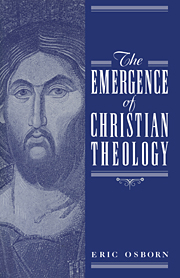Book contents
- Frontmatter
- Contents
- Preface
- List of references
- List of abbreviations
- 1 One God: questions and opposition
- 2 The One and the Mind
- 3 The Bible as the material of theology
- 4 One God as cause and father
- 5 The unity of all things in Christ
- 6 One God in a new way: by the son and spirit
- 7 One good
- 8 One mind, truth and logic
- Conclusion
- Appendices
- Bibliography
- Index of modern writers
- Index of subjects
- Frontmatter
- Contents
- Preface
- List of references
- List of abbreviations
- 1 One God: questions and opposition
- 2 The One and the Mind
- 3 The Bible as the material of theology
- 4 One God as cause and father
- 5 The unity of all things in Christ
- 6 One God in a new way: by the son and spirit
- 7 One good
- 8 One mind, truth and logic
- Conclusion
- Appendices
- Bibliography
- Index of modern writers
- Index of subjects
Summary
‘All philosophers, then, even if unwillingly, reach complete agreement about the unity of God when they come to inquire into the first-principles of the universe’ (leg. 7). Belief in one God, who is the first-principle of being, goodness and reason defines the shape of early Christian thought. This is the emergence of Christian theology. Unity may be seen as both simple and complex. As being, God is one lord, universal word and trinity. As good, one God gives one law and provides one end and resource for ethical endeavour, whether by martyrdom or by the right use of his world. As reason, one God leads to one truth of faith and knowledge. Faith leads to and grows with knowledge; there can be no separation. True philosophy is all that has been well said, while heresy is a separate limb, torn from the one body of truth. Christian theology must include physics (i.e. metaphysics), ethics and logic.
(i) How did Christian theology emerge? Theology was a response to diverse objections from four complex sources. However, rebuttals of objections do not by themselves produce coherent statements. For the objections commonly come from different, even contradictory positions. Therefore we may expect inconsistencies like those in Clement's account of marriage.
- Type
- Chapter
- Information
- The Emergence of Christian Theology , pp. 283 - 294Publisher: Cambridge University PressPrint publication year: 1993

